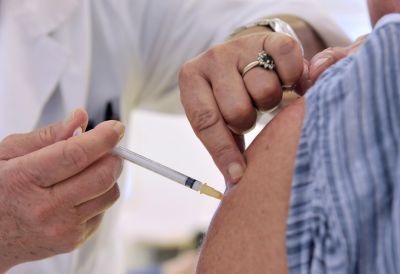France joins Europe flu vaccine sell-off

France has joined other European countries in selling off millions of its emergency swine flu vaccines, the government announcing Sunday it had bought far more than needed to fight the outbreak.
"We started with a plan for two-dose vaccinations but since one dose is sufficient we can start to re-sell part of the stock," a French health ministry official told AFP.
Like Germany, the Netherlands and some other European countries, France has witnessed less demand than expected after spending 869 million euros (1.25 billion dollars) on vaccines for the A(H1N1) virus.
France bought 94 million doses - almost one and a half for every member of the population - but so far only about five million people are recorded as having been vaccinated since the programme was launched in October.
The government took the decision to sell some of its stock after European medical authorities said a one-off vaccination was enough to protect against the virus.
The health ministry said Qatar had already bought 300,000 doses and Egypt was negotiating to buy two million. France was also in discussions with Mexico and Ukraine, it added.
Among the companies France bought its vaccinations from, Sanofi Pasteur, a unit of French drug maker Sanofi-Aventis, said it was "willing to examine" its contract with the French government, should it received renegotiation requests.
Half of the 28 million doses of Sanofi vaccines have been delivered to France, in a contract worth 175 million euros (250 million dollars), the rest are to be delivered during the first quarter of 2010.
In December, Germany said it was looking to sell off vaccines even though its full order of 50 million doses was not due to be delivered until March. Only about five percent of the population had been vaccinated there.
Germany reported requests for vaccines from Afghanistan and central European countries including Ukraine, which is also now negotiating with France.
The Netherlands announced in November that it would sell 19 million of the 34 million vaccines it ordered to countries with a shortage of them, judging that the danger had passed.
Spain's Health Minister Trinidad Jimenez told Sunday's El Pais newspaper that Madrid expected to buy a total of about 13 million doses - little more than a third of its earlier estimate of 37 million.
The World Health Organisation said last month that the A(H1N1) virus was peaking in much of western Europe, as the disease progressed into central Europe and through parts of Asia.
German authorities said Moldova, Kosovo, Mongolia and the Maldives had approached them asking for vaccines to be donated as aid.
In Britain, a health ministry spokesman told AFP Sunday London's priority was still to supply high-risk groups, such as the very young, the elderly, pregnant women and people with underlying health problems.
But he added: "We are also considering sale to countries still seeking vaccine."
The latest British figures for the outbreak, issued on Thursday, indicated that the rate of swine flu infection was falling. But opinion polls suggested that in any case many people were reluctant to take the vaccine.
In Italy, the health ministry's head of preventive medicine, Fabrizio Oleari, told the ANSA agency no decision had yet been made on whether to sell excess stock.
But Italy had already undertaken to give 10 percent of its stock to poorer countries, he added. So far, only 840,000 of the 48 million doses purchased have been administered.
The WHO said last week that swine flu had killed at least 12,220 people worldwide with the biggest share of victims in the United States and Canada, though it was now declining in North America.
In France the opposition Socialists' health spokesman Jean-Marie Le Guen called the government's strategy a "fiasco", saying in a statement that despite its "exaggerated" spending France still had a very low rate of vaccination.
Disease specialist Marc Gentilini, a former president of the French Red Cross, also criticised what he called France's "extravagant" and costly mass vaccination campaign.
"Preparing for the worst wasn't necessarily preparing correctly," he told AFP.
bur-rlp/emb/boc
Join our commenting forum
Join thought-provoking conversations, follow other Independent readers and see their replies
Comments